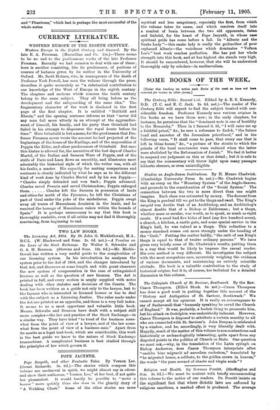Western Europe in the Eighth Century and Onward. By the
late E. A. Freeman. (Macmillan and Co. 10s.)—There seems to be no end to the posthumous works of the late Professor Freeman. Recently we had occasion to deal with one of these ; here is another consisting, like its predecessor, of portions of courses of lectures given by its author in the University of Oxford. Mr. Scott Holmes, who, in consequence of the death of Professor York Powell, has seen the volume through the press, describes it quite accurately as "a substantial contribution to our knowledge of the West of Europe in the eighth century. The chapters and sections which concern the tenth century belong to the same subject. They all bring before us the development and the safeguarding of the same idea." The fragmentary character of the work is disclosed in the first page of the first chapter. It is entitled " Balthild and Ebroin," and the opening sentence informs us that "never did any man fail more utterly in an attempt at the aggrandize- ment of himself, his family, and his party than Grimbald had failed in his attempt to dispossess the royal house before its time." Here Grimbald is but a name, for the good reason that Pro- fessor Freeman never wrote the account he had projected of the beginnings of the house of the Karlings, and of the mayoralties of Peppin the Elder, and other predecessors of Grimbald. But once this hiatus is allowed for, the narrative of the last days of Charles Martel, of the Italian and Saracen Wars of Peppin, and of the strife of Paris and Leon flows on smoothly, and illustrates most admirably the historical style of which the writer was, with all his faults, a master. His capacity for making comparisons and contrasts is clearly indicated by what he says as to the different kind of work done by Charles Martel and by his son Peppin :— " Charles simply defended and won back ; Peppin advanced. Charles saved Francia and saved Christendom; Peppin enlarged
them Charles left the Saracen in possession of lands and cities far north of the Pyrenees; he left the Christians of part of Gaul under the yoke of the misbeliever. Peppin swept away all traces of Mussulman dominion in the lands, and he received the homage of Mussulman rulers within the bounds of Spain." It is perhaps unnecessary to say that this book is thoroughly readable, even if all critics may not find it thoroughly convincing, from beginning to end.






































 Previous page
Previous page